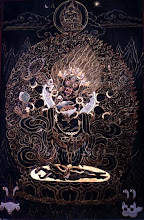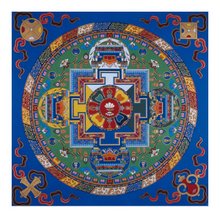I've been obsessed over the last month with Minidisc. Admittedly, it's a strange obsession, especially as I've been a Minidisc user for more than a decade and never had this kind of preoccupation with technology since I was first introduced to Macintosh back in 1985. I find myself these days hanging out at the Minidisc forums, reading posts about the quirks of SonicStage (software that allows the Minidsic to interface with the computer
), ogling photos of Minidisc units like teenage boys do pictures of Jessica Alba, looking at online shopping venues for bargains on old Minidisc player/recorders, and making Minidisc compilations.
I thought I'd forever given up on Minidisc in favor of flashdrive music/media players. The latter seemed more convenient, allowing drag-and-drop copying from the computer without the need for the Minidisc's proprietary software, as well as much greater storage capacity than Minidisc's maximum 1GB. I bought one such player before going on my Shikoku pilgrimage but found it was not as convenient – nor did it provide as good sound quality – as Minidisc. I put that down to the manufacturer and model of my player, though, and not the entire format, and was before leaving for Nepal browsing Fukuoka retailers for a better flashdrive player. I found what I thought I wanted but then began the process of reconsideration before spending the equivalent of a few hundred dollars – do I really need this? ¥30,000 for a new player, versus ¥1500 for 3GB of rerecordable blank Minidiscs (in addition to the 3GB I already owned, plus all the files I'd be carrying on my laptop). I took the practical option, put away my desire for a new toy, and dusted off the one I had.
I'm not sure what led me to The Minidsic Forums. I'd been there the year previously to ask a question about a software problem, but this time around I think it was probably just an idle day at the computer. Maybe I was cleaning up old bookmarks in my browser. For whatever reason I stopped by and began perusing the topics and found myself drawn to the news items, which are in short supply these days as Sony is the sole remaining manufacturer of a product that has very narrow appeal, mostly for those needing a high-quality portable recorder, and to a number of what you might think of as Minidisc dead-enders, guys (mostly guys) who post to the MD forum with statements like:
- Anyone who thinks MD is "useless" doesn't understand how to use MD.
- MD will still be in use long long after your virgin career is forgotten.
- Long Live Minidisc!
- ATRAC or Death!
I found much to like in their passion for this mostly forgotten technology. In their confident embrace of the proven and their stubborn unwillingness to buy into their latest trends, this unlikely clan of audio geeks now find themselves using a product which has a bit of retro-chic. Check the auctions at Ebay or Yahoo Japan and you'll see that many of the older player/recorders chalk up quite a few bids.

As I got caught up in their defiance of the iPod and their proud declamations of loyalty, I found myself reliving memories of my Minidisc glory days. My first machine was a bookshelf component system, the
Aiwa XR-H3MD, followed shortly thereafter by Sony MZ-R50 Walkman, both purchased soon after moving to Fukuoka in 1997, back when a connection to the internet was through a dial-up modem and downloading one mp3 might take a whole day. While the technology wasn't yet available for instant delivery of music, email allowed music fans and Minidisc owners to exchange lists of CDs and arrange MD trades delivered through the post office. Little communities of MD traders existed within genre specific web forums, like the seven of us at the
Contemporary Jazz Forum, one each from Australia, Japan, Germany, Croatia, Venezuela, and two in the US. For a couple of years I sent out packages to at least one of these guys weekly, and got as many in return. There was also a Yahoo Groups list of MD Traders, a website called the MD Traders Post, and bootleg trading newsgroups, all of which served as conduits for making contact with fans of every variety of musical genre and interest. A fellow in New York used to send me compilations of Arab, African and Indian music; a friend from the UK sent BBC radio documentaries; I traded concert recordings of Springsteen, U2, Prince, Oasis, The Verve and Kula Shaker with collectors from all over Europe, North America, and Asia. Besides enriching the post office and building a library of what I guess is about 500 MDs (at least 75% from trades), I also had a chance to visit with several of my fellow traders, including Larry in the US and Rainer in Germany, and one - Luis from Venezuela – had a chance to pay a visit to Japan.
By the early 00's CDR had become more widespread and a large number of new traders quickly arrived in the trading venues. At about the same time the internet started picking up speed and it became possible to share files through Napster and its offspring. The camaraderie of the MD community began fading away and Minidisc began to look more and more like a soon-to-be extinct and orphaned technology. At the same time I was beginning to get so much promotional material through my radio job that I didn't have much need to continue trading and so my recording was reduced to making MDs for my Walkman, which went with me nearly everywhere, everyday.

In fact my one constant travel companion, with me even when Mutsumi couldn't be, has been my Sony MD Walkman and a box of discs. The MZ-R50 went twice to Europe, on my first visit to Nepal, and on several journeys to Thailand and the United States. This unit was later replaced by the MZ-R909, which you might remember was lost last year in a funeral procession in Kathmandu, where I made an immediate replacement purchase, the MZ-NH600D. Many travel memories are closely associated with music played through my MD Walkman, including the Brand New Heavies on the bus ride from Kathmandu to my job posting in Baglung, walking the streets of Madrid with Los Amigos Invisibles, Keiko Matsui, Rick Braun and Dave Koz on the train across Germany to the Czech Republic, bouncing through Seoul Airport to Oasis, dancing to Prince on the Dragon Guest House roof, and most recently enjoying a glass of wine with White Snake in Bangkok Airport.
I suppose many people have similar stories to tell about their Minidsics or their iPods or whatever bit of technology they use to carry their music. But what to make of this recent fetishistic behavior? Why am I all of a sudden, more than a decade later, suddenly interested in different makes and models of MD players? Why the sudden interest in owning more than what I can reasonably use on any given day?
It must, I've concluded, be part of the process of adjusting to living in Nepal again, the process of learning to live with less, the process of again turning the attention away from consuming. In reaction, the mind is flailing about looking for an object on which to fixate, some “thing” on which to direct its acquisitiveness. It was recently abetted by my move to a room with 24-hour internet access, giving me the ability to visit MD related websites morning, noon, and night. Just yesterday, though, I moved back to my old home at the Dragon and was able to have a refreshingly uninterrupted night's sleep. From here I have no connection to the internet and so when my mind might otherwise pull me toward the MD forums or perusing MD auctions, I have no way to satisfy that particular urge and redirect my energies elsewhere.
And that is a welcome relief. Not only because I realize this attraction is a waste of energy, but also because I can now direct the mind to something more interesting and more fruitful, like tackling the 1000+ pages of the Majjhima Nikaya, which I 'd like to finish before leaving for India in mid-December.

In the meantime, if anyone wants to send me their forgotten and no longer used portable MD player/recorder, I would be very happy to relieve you of your junk. I'll even pay postage. Send me an email (at fukuokajeff_at_gmail) and I'll reply with my address.
#


















































